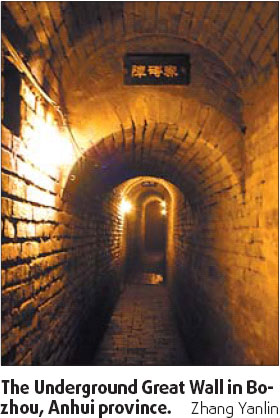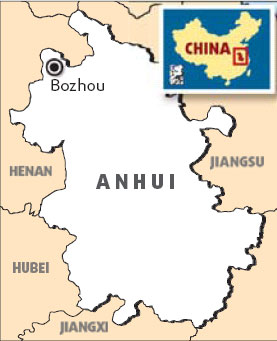In 1966, a science fiction TV series called The Time Tunnel took audiences in the United States by storm. Three years later, under an ancient city of Central China, a real "time tunnel" was discovered, which could take one back more than 1,500 years.
This was the 4,000-m-long Underground Passageway for Army Deployment in the Period of Cao Cao (AD 155-220) in my - and his - hometown Bozhou of Anhui province - a city with a history of more than 3,000 years.
Being the country's oldest and biggest underground defense facility, the passage is also known as the Underground Great Wall.
The deep passageway, built by the founder of the Wei Kingdom during the Three Kingdoms Period (AD 220-280), meandered through the city in all four directions. All kinds of traps and complicated terrain made the "tunnel" a maze, which was used to send groups of soldiers out of the city to attack the enemy from behind.
However, hundreds of years later, when I was a child, the passageway became our playground, promising hours of adventure. Sometimes, the adventure could turn into tragedy when some students in my school got lost and one of them died before rescuers reached them.
At present, out of safety concerns, only 600 m of the passageway is open to the public. If you do visit, you'd better not take your knapsack because it is only 70 cm wide. Once there, you can glimpse the military genius of Cao Cao, a controversial figure who was often portrayed as a cruel and merciless tyrant.
But in my hometown, most people respect Cao and are proud of being his fellow townsmen. This can be seen in the giant statue built in his memory right in the center of the city.
We are also proud of another townsman, Hua Tuo, who was a great physician and was, ironically, killed by Cao for refusing to treat him.
To honor this pioneer of the use of acupuncture and moxibustion, the townspeople have built the Huazu Buddhist Convent. It is an ideal place to learn of his legendary life and remarkable work in Chinese medicine.
When you take a walk along Bozhou's streets, you can easily "smell" that this is Hua Tuo's hometown. Hundreds of Chinese medicine stores can be found at almost every street corner.
Many people around me joke that I must live long having been exposed to these "healing" scents from a young age. I do not know about that, but I must admit to being partial to traditional medicines to keep me healthy.
The other scent that comes to mind when I think of my hometown is that of white liquor. Bozhou has a long history of distilling white liquor and is one of China's biggest producers of this spirit.
As a little girl, I often took a little bottle and went to buy white liquor for my grandfather. When I came back, he would let me sit on his lap and feed me some fried peanuts, which were a perfect match for the liquor on the table.
I often look back fondly on those times.
(China Daily February 21, 2008)



